Following the success of its
Canvas 2 and
Canvas HD smartphones, Micromax has been able to establish itself in the Indian smartphone space as a player that offers the best value for its customers' money. While the company's two best selling smartphones brought a large screen and a 720p screen, respectively, at a crowd pleasing price, it now wants to leverage its Canvas sub-brand further by offering niche products while continuing to expand its portfolio of flagship devices.
For its new flagship, the
Micromax Canvas 4 (A210), the company created a lot of buzz, right from the promo teasers on TV during the high profile India vs. Pakistan clash in the ICC Champions Trophy to taking pre-orders for the phone without announcing its specifications. The Canvas 4 promises better build quality and new smart features but essentially builds on the Canvas HD, and includes almost the same hardware, under the hood. Does the phone live up to the hype around it? We try to answer this question in our review.
Build/ DesignThe Canvas 4 follows the same design cues that we've seen in the Canvas HD and Canvas 2, and from a distance, the phone doesn't look very different.
On closer inspection you'll find that the phone looks a bit more polished than its predecessors, though it's still a little bit plasticky for our taste. The phone is available in White and Grey colour variants and we had a White Canvas 4 as our review unit.
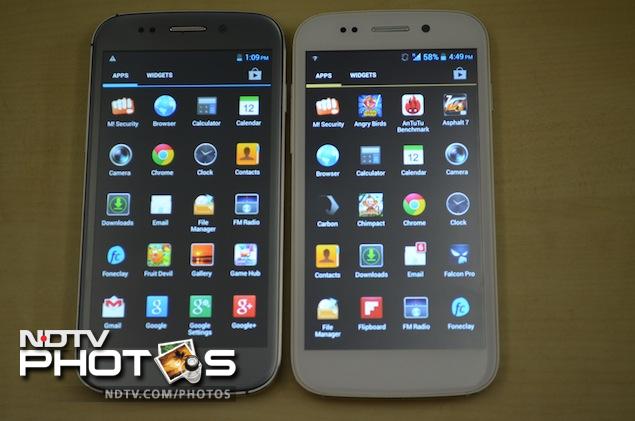
The front of the phone is dominated by the 5-inch display, below which you'll find the three capacitive touch keys for Menu, Home and Back. A chrome grill that serves as the earpiece, the sensor array and the 5-megapixel front camera are placed above the display. The bezel is wide but it's not flat as it meets and the edges and there's some embossing, similar to the Galaxy SIII.
The phone is surrounded by an aluminium frame in the middle, which gives it a premium look and makes it feel sturdy. The company says that it also acts as the cellular antenna. You will also notice that the frame has small white bands at the left side, at the bottom and at the top.
The Power/ Screen-lock key is located at the right side of the phone, while the Volume rocker key is place at the left side. Both these keys are also made of metal but are a bit rickety as they are not firmly fixed. When you shake the phone, you'll also hear some sound coming from the same area due to their movement. The Micro-USB port is located at the bottom. The 3.5mm headset jack sits at the top of the phone.
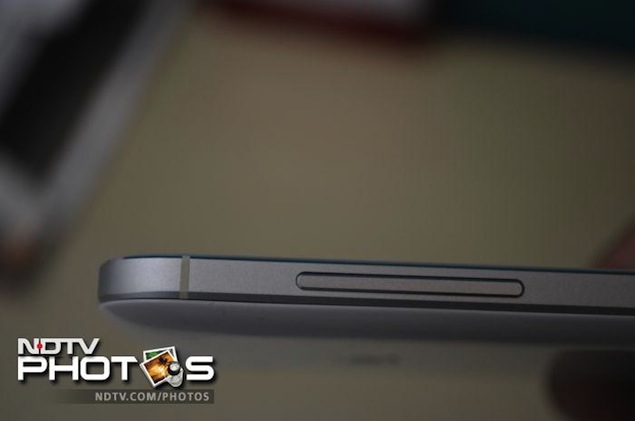
The back features a removable plastic cover that sports a glossy finish but there's a mild texture effect as well, which you'll only see when you look closely. There's some Micromax branding at the lower part, and a silver sticker like m! logo as you go up. The 13-megapixel rear camera is located right at the top in a round chrome ring enclosure, along with an LED flash and a secondary microphone.
Opening the cover reveals the battery compartment. The microSD card slot and two SIM card slots are placed just above the battery compartment.
DisplayWhile everyone was hoping that the Canvas 4 would come with a full-HD display, Micromax has decided to skip the upgrade and has included a 720p display, similar to that of the Canvas HD. The phone's 5-inch HD IPS screen sports a resolution of 720x1280 pixels and a colour depth of 16.7 million. Thanks to the higher resolution, text, icons and images look much sharper compared to qHD phones. There was no pixelation. However, we felt that the screen's colour temperature was skewed towards the colder side, with whites carrying a blue tinge.
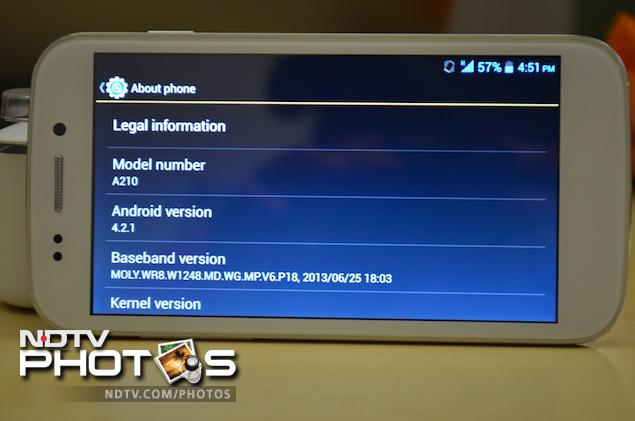
Under sun visibility was good, though the screen is very reflective. Thanks to the IPS panel, we found that the viewing angles were very good, which essentially means that more than one person can view content playing on the screen properly, even from different angles. We also found the touch response of the screen to be better than most budget phones. Micromax has also included Corning Gorilla glass protection to guard the screen from scratches.
Software/ InterfaceThe Micromax Canvas 4 runs Android 4.2.1 Jelly Bean, the latest iteration of the OS. Micromax has skinned some elements of the user interface, such as the app icons and the Settings menu.
The phone also offers four themes, namely Mint, Mocha, Raspberry and the default theme that bring minor changes in the phone's colour scheme.
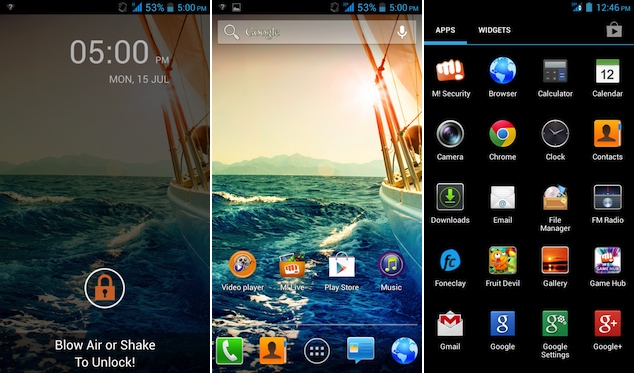
The notification tray features a settings shortcut and a clear all notifications button, along with expandable notifications (expanded with the two-finger pull gesture). It features the same setting toggles shortcut that's found in stock Android and adds some of its own as well, for quick access to Airplane Mode, Battery status, Wi-Fi, Bluetooth, GPS, Data connection, Data usage, User (audio) Profiles, Brightness, Screen backlight timeout and Auto rotation.
Similar to most other Android devices, there are five customisable home screens that can be filled with app shortcuts and widgets. The three capacitive buttons, Home, Menu and Back help in navigating through the phone, with the Home button also doubling up as an app switcher on long press.
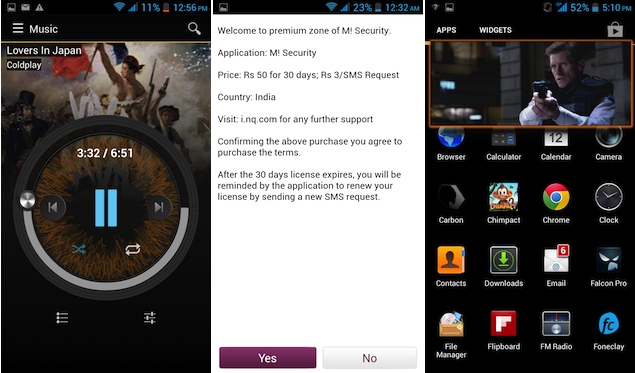
You also get lock-screen widgets, an Android 4.2 feature. You can choose from the Clock, Camera, Gmail, Google Now and Messaging widgets in addition to widgets offered by third-party apps installed on your phone. These widgets offer glanceable information from the apps and allow users to perform certain app actions even when the phone is locked.
The phone also offers another Android 4.2 feature, Daydream, that displays photo albums or the clock while the phone's charging. The option to wirelessly mirror the phone's display with an HDMI enabled device through a wireless display adapter is also present.
Micromax has also added some software tricks to the phone, one of which is a new lock screen mechanism that allows the phone to be unlocked with a blow of air or if the phone is shaken. This can be activated through the M! Unlock app that has been developed in partnership with FoneClay. It works as promised but disables the lock screen widgets, so we just feel it's too gimmicky.
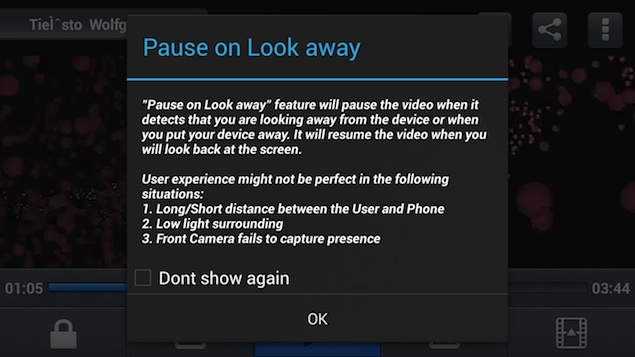
Micromax has also bundled a new Video Player app with the phone that offers features like 'Pause on look away' using the front camera to detect if you're looking at the screen of the phone, and automatically pausing and resuming videos. We've seen this feature in high-end phones like the
Samsung Galaxy S4 and the
LG Optimus G Pro. You can increase and decrease the volume or brightness while playing a video by just swiping up and down the screen at the left and right hand sides. It also allows you to preview one video while playing another one, and view videos on a floating player window while doing other tasks through its pop-out feature.
The Music player has also been revamped and now features fancier controls in the Now Playing screen and integrates the Micromax Online music store. The Music Store is still a website wrapped into the app and allows you to download music tracks and videos. It only lets you download tracks when you access the site through 3G/ Edge as billing is integrated with the telecom operator. The Music Player app also features Equalizer settings.

Micromax has also included some of its own apps including content stores, M! Live and Game Hub, and services store, M! Zone, in addition to a few 'try and buy' games (Fruit Devil, NFS Shift, The DarkMan). There's also security software powered by NQ Mobile that allows you to backup contacts, and track your mobile in case you lose it. However, even this utility is not free and you need to pay additional charges to get all the functionality.
The handset also offers FM Radio and FM radio recording.
Micromax has also modified the Messages app, adding a Smileys input option next to the text entry prompt, and a button for attaching multimedia, contacts and audio clips, among others, with it. Micromax has also added a file manager app, a NoteBook app, a ToDo app, in addition to a universal search app and a Popup Browser that can be used for browsing the web in a floating window while working on another app. It has also replaced the stock camera app with a different one.
For the first time Micromax has replaced its own instant messaging app, HookUp with a Micromax branded version of Hike, the mobile messaging app from Bharti Softbank. It has also pre-installed the movie streaming app Spuul, that allows users to watch movies for free.
It's also worth pointing out that the Canvas 4 is the first Micromax smartphone that supports over the air software updates via a System Software app. Previously one had to take the phone to the service centre to get the latest Android update installed.
The phone also offers gestures like flip to silent, ability to answer the phone by bringing it near to the ear, and dial the number on the screen when the user brings the phone near the face.
CameraThe Micromax Canvas 4 has a 13-megapixel rear camera and a 5-megapixel front facing camera. Both the camera lenses are an upgrade from the Canvas HD's 8-megapixel rear shooter and VGA front facing camera.

As we mentioned earlier, Micromax has put its own camera app. The app includes Normal, HDR, Face Beauty, Smile detection, Exposure compensation, Panorama, Photosphere(multi angle view) modes. It also offers a burst mode, letting users click up to 99 shots at once. The photo mode allows users to modify settings like Exposure, colour effect, ISO and white balance, among others. There's a self timer of up to 10 seconds as well.

We experienced a minor lag when we tried to focus on an object and press the shutter. We also noticed that there is minor delay between two consecutive camera shots in the continuous shot mode. This makes it hard to capture images quickly. The quality of the pictures taken during daylight was decent. However, photos taken indoors under artificial light were a bit grainy and at times looked different than the actual setting. The camera tends to soften the tone to a cooler shade.
The Canvas 4's camera also struggled when trying to capture images in low-light.

The camera is capable of recording full-HD video and takes good quality videos depending on the ambient light. However, it saves video clips in .3GP file format, which is an older file format.
The 5-megapixel front camera takes above average pictures, and can be used for video conferencing. We wish the phone had a dedicated camera button to help click a quick picture.
PerformanceThe Micromax A210 Canvas 4 is powered by a 1.2GHz MediaTek MT6589 quad-core processor with 1GB RAM onboard, and PowerVR SGX544MP GPU. There is 16GB of internal storage, 10GB of which is available to the user.
With Android 4.2 Jelly Bean, the overall experience of navigation through the interface was impressive, thanks to Project Butter and the phone's quad-core processor. We did not experience any lag while launching apps, playing games, scrolling web pages or switching between apps. It is safe to say that performance wise, the Canvas 4 scores well. We were able to play games like Jetpack Joyride, Chimpact, Asphalt 7 and Shadow Gun without encountering any lag.
We were also able to play full-HD clips, with the phone supporting formats like .AVI, natively, though we experienced some issues with audio while playing an MKV format video. This was easily fixed by downloading a third-party video player. The speaker on the phone delivers average quality sound at high volume levels, but there's some muffle when the phone lies on its back, as the speaker grill is located on that side. The headphones that come with the phone offer average quality sound output. Call quality was good, during our testing process.
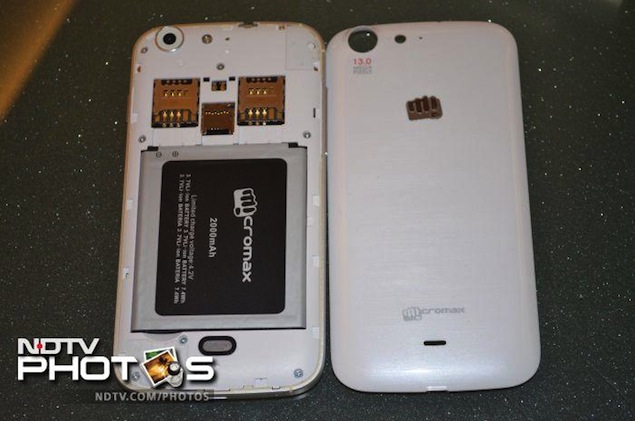
The phone comes with a 2,000mAh battery, and based on our experience, it will just about last you a full day. We charged the phone in the morning (at around 10am), and with medium to heavy usage, including 1-1.5 hours of phone calls, two e-mail accounts with push notifications, screen at maximum brightness, playing some music and video clips (about an hour), casual web browsing, Twitter notifications and WhatsApp chats, the phone lasted 8-9 hours. We had put the phone on Wi-Fi for about an hour or two while the rest of the day it was connected to data via 3G. We had turned off auto-brightness, and the phone was on the highest level of brightness. Altering these settings might help in running the phone for a longer duration, depending on your usage pattern.
VerdictThe Canvas 4 is at best an incremental upgrade to the Canvas HD. Apart from the 'better camera' which we didn't find any better and slightly improved build quality, it doesn't bring anything extra ordinary to the table. The software features that it offers are gimmicky and can be added with the help of some third party apps available on the Google Play Store. You are unlikely to use them on a regular basis. The only thing we're happy about is the increased internal storage capacity, which will allow users to install more apps.
The asking price of around Rs. 18,000 is on the higher side when you compare it to the Canvas HD or to phones like the
Zen Ultrafone 701HD and
Gionee Elife E3. We'd recommend waiting for a price cut or buying the Canvas HD if you're in the market for a good value for money Android smartphone.

Micromax Canvas 4
Price: Rs. 17,990
Pros
- Good screen
- Decent performance
Cons
- Questionable value for money
- Underwhelming build quality
- Camera performance could be better
Ratings (Out of 5)Design: 3.5
Display: 4
Performance: 4
Software: 4
Battery Life: 3.5
Value for Money: 3
Camera: 3
Overall: 3.5
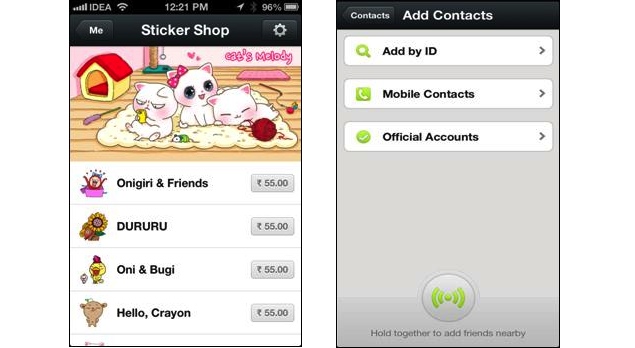










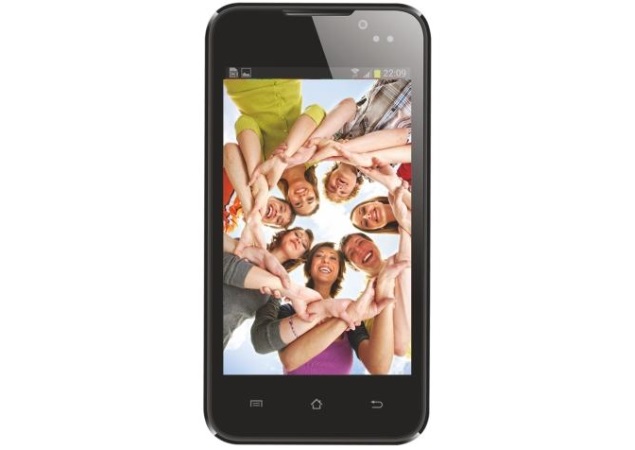
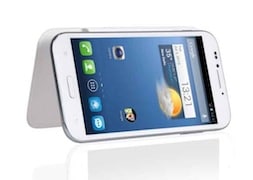

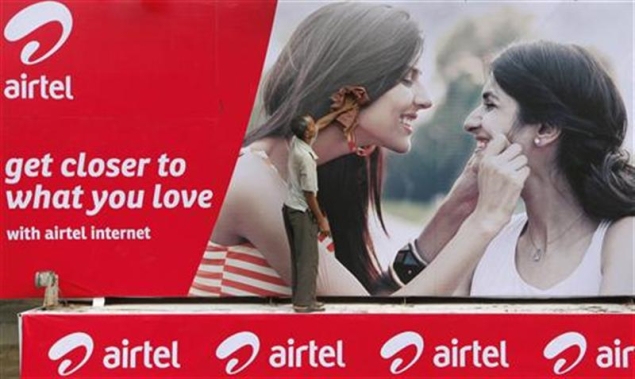
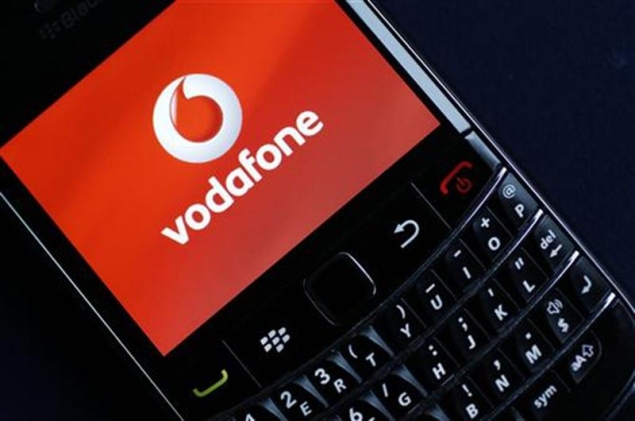

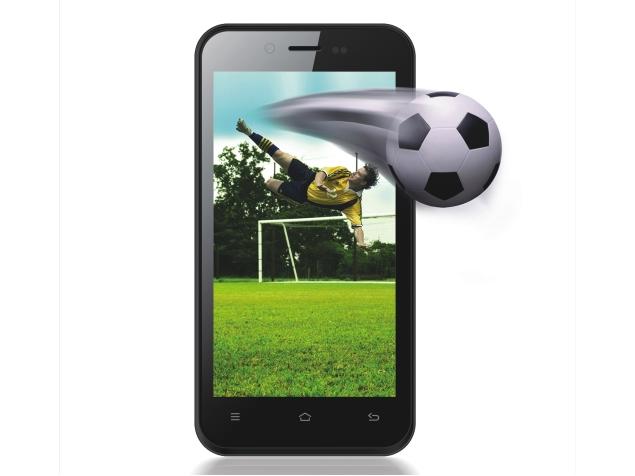
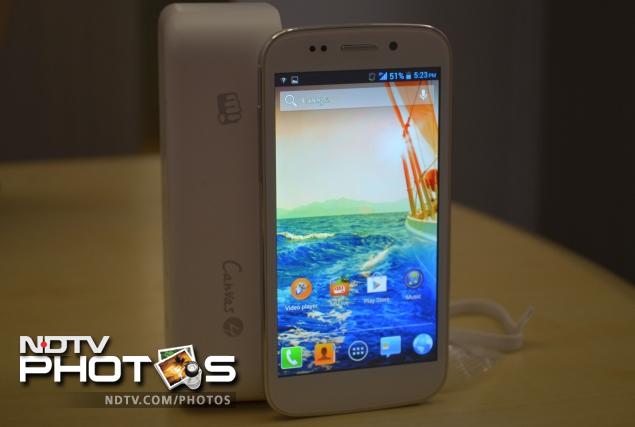












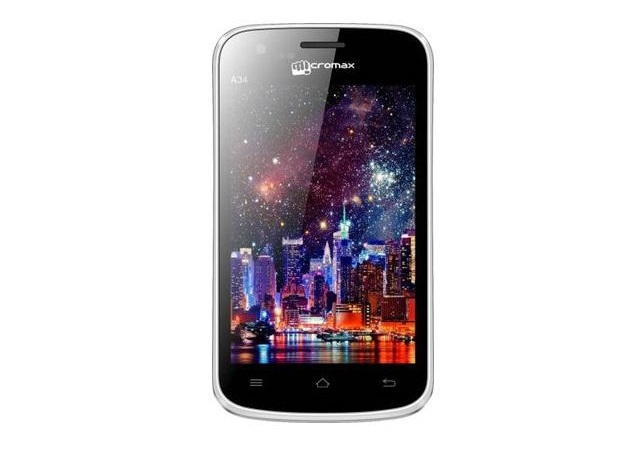
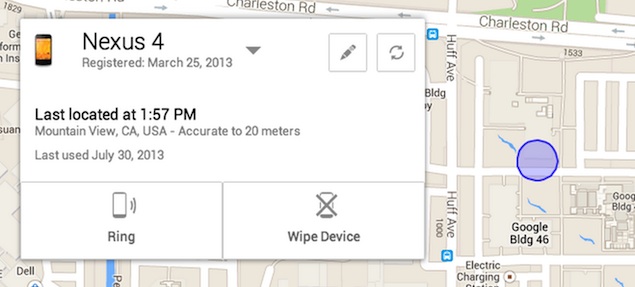





 .
.